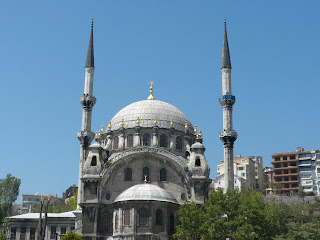 |
| EU Court of Justice -- Luxembourg |
I recently had the opportunity to be a participant in a week long Fulbright program concerning the European Union and NATO held in Luxembourg and Brussels. Given Turkey’s status as an EU “wannabe” and my weak knowledge of the EU, it was a very interesting week.
I learned a huge amount, the main thing being that understanding the EU is about as complicated as understanding the US and how all 50 of our states (plus DC and the territories) function. For example, a country can be in the EU, but not use the Euro (e.g., UK, Hungary, Czech Republic, and others). Some of those members have permanently opted out of the Euro (e.g., UK), but others (e.g., Hungary) must still aspire to using the Euro. And any future EU members must all promise to attain Euro status.
Furthermore, there are other countries that are in the EU, but not in the Schengen Zone (which permits free passage without passport from one country to another) (e.g., UK), and others that are NOT in the EU but are in the Schengen Zone (e.g., Switzerland).
 |
| Lunch at the Court of Justice |
 |
| Dessert at the Court of Justice |
 |
| EU Council |
And then there are the EU wannabe’s, such as Turkey. Turkey probably won’t achieve EU status anytime soon (if ever) for a number of reasons. 1) Do they really gain anything? Probably not economically, but as my colleagues point out, joining the EU might help to stop the recent trend toward more conservative and repressive politics. 2) The US is a strong supporter of Turkey’s EU status, but that’s like Germany supporting Mexico as our 51st state. We wouldn’t pay any attention at all! 3) Though the EU might actually gain economically from Turkey’s accession, there is a lot of anxiety because: a) Turkey would be the largest country geographically, b) Turkey would be the 2nd largest country (after Germany) population wise (and would thus have a lot of votes and power in the EU Parliament). 4) There are some unresolved problems, such as the Cyprus issue and freedom of press. 5) An unspoken reason is that Turkey would be the only predominantly Muslim country in the EU.
Now Turkey’s experience in NATO is totally different (even though there is huge country overlap between the EU and NATO). Turkey was in the 2nd group of NATO members, joining in 1952 (even before Germany!). All of our US guides at NATO commented on what a very strong and valued NATO member Turkey is.
Politics aside, it was truly a privilege to be with 29 other Fulbrighters (all located in Europe proper countries) as we made our way through Luxembourg and Belgium on our EU/NATO tour. In addition to the other Fulbrighters being extremely bright and interesting, we had a fascinating seminar program. And as you would expect in this part of the world, the food was unbelievable! And I don’t just mean nice lunches, but these were really nice lunches with red and white wine!
My take home lessons: 1) keep working on learning foreign languages; 2) we have a lot in common with the EU; 3) we need to learn from each other.


















































